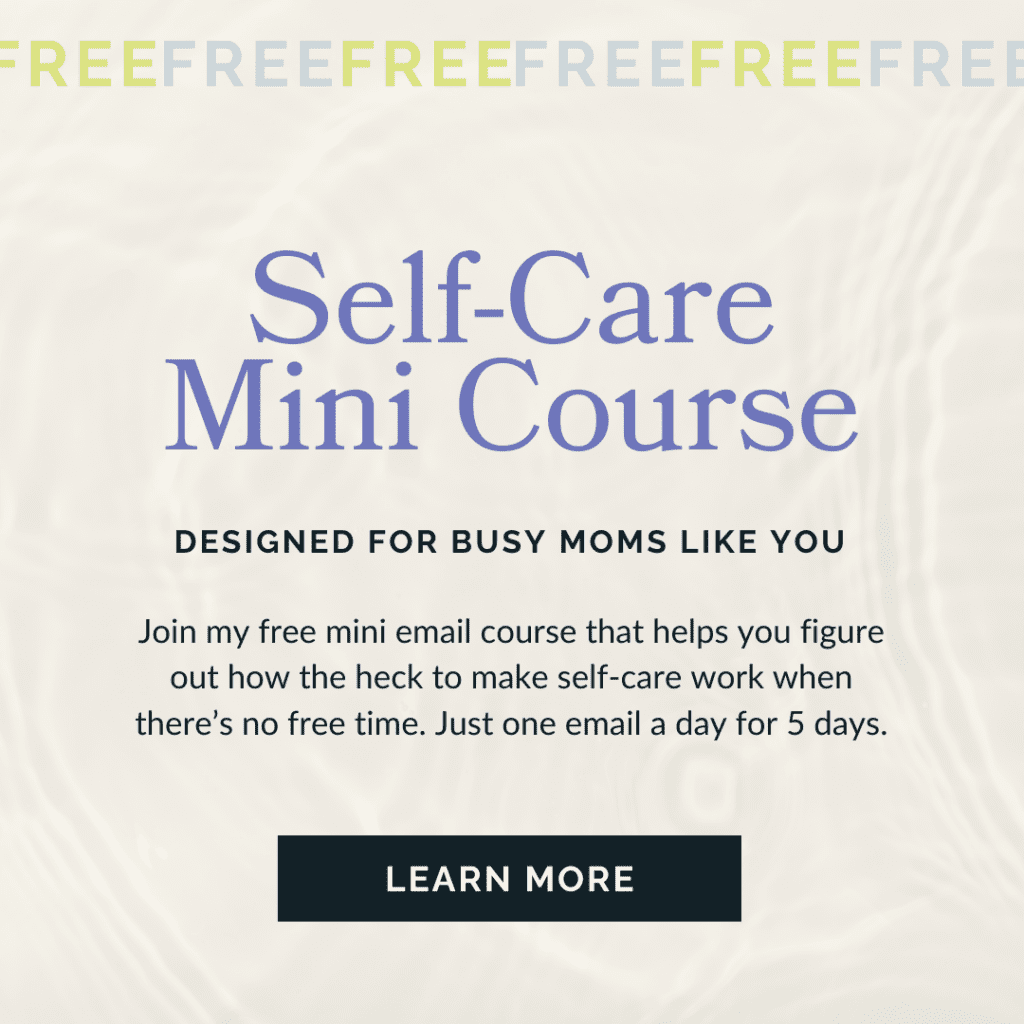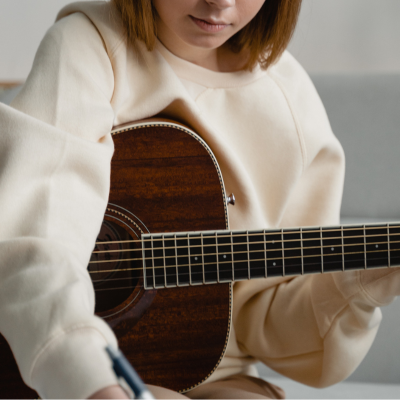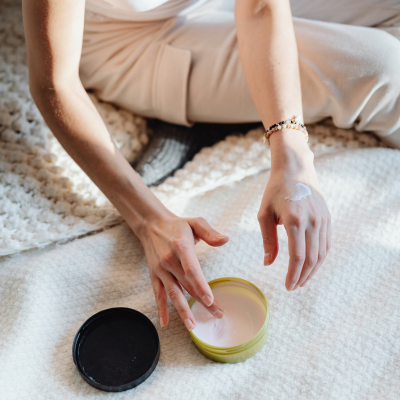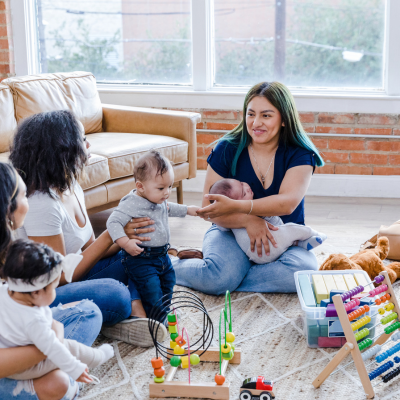In investing in hobbies and interests, you’re showing yourself that you matter.
Giving back to yourself is self-care. You may not know it now or, you may logically know that but when it comes to actually practicing it, you may struggle to put the pieces into place. Now, I know that motherhood can turn into a self-sacrificing endeavor. I mean, society pushes the idea of people-pleasing onto us as girls and women throughout the course of our entire lives. That happens even more as a mother when her children are involved.
The mom who sleeps in on Saturday as her husband makes breakfast is seen as lazy or lucky.
The mother who spends money on facials and nice clothes is often seen as selfish or frivolous. The mom who goes out on a Friday night for wine with the girls isn’t prioritizing her family enough. We absorb these messages—even if we don’t agree with them or believe in them. We can take on the expectation of the “mom who does it all,” or silently accept the classic fob off that, “this is just what motherhood is.” Before you know it, you’re pushed off the priority list.

I want to challenge that. Because let’s entertain the worst-case scenario for a moment. That being the one where you give and give and give… until you’re burnt out, depleted, used to running on fumes, and you’ve lost yourself entirely. I’m not forcing you to look at this scenario to fear monger, but to gently urge you to understand what self-identity loss in motherhood is and the negative impact it can have on your wellbeing.
Imagine only ever making others (your kids, your partner, your extended family) a priority and never putting yourself on the list. Ever. If that were to happen for years (and perhaps it already has), you’d lose your spark, right? That you-ness that is so real and vibrant. You may feel disconnected from your former, pre-kids self. You might not like—or be comfortably able—spending time with yourself. You may struggle to make decisions for yourself because you always default to asking someone else. Your confidence and self-esteem would probably tank as a result. And you may eventually just not even know what you like! Your favourite foods, your ideal way to spend a Saturday, where you’d like to go for vacation, what you’d like to do with a spare evening… all of those might just become question marks. That’s a tough scenario to look at, and maybe even one that already feels true. I get it, I’ve felt those things too.
Defining self-identity
Let’s back up here and define what self-identity actually is. Self-identity is the parts of you that make you who you are. Are you the creative who makes ceramics and writes first thing in the morning? You might be the career-oriented go-getter who always has a workshop, new side hustle, or passion project in the works. Maybe you’re the social butterfly who likes to keep your home neat, decorating and welcoming for those who you have over for Friday night wine and charcuterie. Or you’re the outdoorsy girl who knows the best trails and camping in your area because that’s where you spend your off hours.
Who are you? What brings you joy? What do your friends love about you? What do your family members celebrate about you? If you could go back to a day in the recent past and relive it again, which day would it be and why? These questions are really helpful ones to sit down and ask yourself because they help you get clear on your identity and what makes you the unique person that you are.
How to make personal identity part of self-care
Giving back to yourself and continuing to invest in—and grow—these pieces of yourself is self-care. That’s because you’re recognizing certain needs that you have (i.e. spiritual, creative, social, intellectual) and you’re doing something about it!
Human beings need more than just the physical basics like water, shelter and food. In investing in hobbies and interests, you’re showing yourself that you matter and that you’re also allowed to pursue the extras in life. And that it’s not only your kids/family who are deserving of your time, thought, and energy.
But if you want to make identity growth part of your regular life, how can you actually do that?
Because we all know that motherhood and parenting easily gets in the way. It’s unrealistic to think or expect that you can give yourself the same energy that you may have during other chapters of your life. The baby years are especially tough so during an era like that, the bare minimum might have to do for a while. So of course I’m not suggesting that you book spontaneous weekend trips, stay up until dawn with your friends, or ditch your responsibilities and go off-grid. But what I am suggesting is that you get reacquainted with your old self and invite her into your life—whatever that looks like for you today.
Here are some really simple ways that you can do that.
Easy ways to nurture self-identity:
- Journal about what you think the core parts of your identity are, what do you miss about yourself, and what parts you’ve neglected. Prompts: What kind of woman do you want to be? When did you feel most like yourself and why?
- Make space for your voice. Pick the Netflix movie. Choose what’s on the menu. Play your music in the background. Hang photos from past travels on the wall. Your opinion matters!
- Take up a new hobby (or rekindle your love for an old one). Mine is currently roller skating and I love it! I also garden, do yoga, and travel. It hasn’t always been this way but the point is to find something that works for your life today.
- Give yourself some of your time back. What’s manageable? Thirty minutes in the morning? Twenty minutes before bed? An hour after the kids go to sleep? Whatever it is, pick something reasonable and commit to it without guilt. This designated time is your space to walk by the river, read a past favourite author of yours, watch stand-up comedy, cook… whatever!
Why your identity matters to your kids
All of this work around self-identity matters for your wellbeing and it also matters for your children.
When you put effort into yourself and recognize that your personality and interests matter, you’re demonstrating self-love and self-respect. When your kids see that, they are more likely to follow your example and become the types of self-respecting people you want them to become. They get the chance to observe you as a role model and as a person beyond “Mum.” It will click with them that “Mum” is also a strong triathlete, or a compassionate person who dedicates herself to volunteering in the community, or a really talented chef, or the life of the party who lights up the room, or a really intelligent woman who remembers facts from nature documentaries. You get my point. There’s a lot more to you than your role as a mom, and I really want you to help let that part shine.
Another perk: you’re teaching your kids to hold space for other people. If you self-sacrifice in the name of always meeting your children’s wants and needs all the time, what do they learn?
Hopefully this post has convinced you that you matter, because you do.
And if you’re feeling as though a loss of sense of self is already an issue, don’t stress! A lot of self-development work is meeting yourself where you’re already at. If you’re feeling a little out of touch with the old you, don’t worry! Think of how you can use some of these new habits, self-reflection questions and journal prompts from this post so that you can be in a totally different place one month, six months, or a couple years from now!
You got this.









Comments +